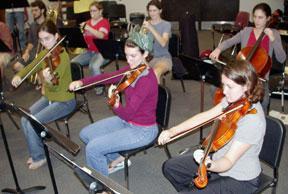The College of Music and Dramatic Arts is considering increasing security at the rest of its concerts following a long list of disruptions at three of last week’s concerts.
According to an e-mail sent to students enrolled in Music 1751 by Willis Delony, the course’s coordinator, there was a “sizable minority” of bad behavior at the Nov. 4 Wind Ensemble concert, Nov. 6 Percussion Ensemble concert and Nov. 7 Jazz Ensemble concert.
Music 1751 students are required to attend four concerts per semester, counting for 8 percent of their final grade.
According to the e-mail, Delony received complaints of people talking on cell phones as well as cell phones ringing, loud conversations that could be heard from the stage, people crowding the stairwells to make a quick exit and people arriving intoxicated.
Frank Wickes, conductor of the Wind Ensemble concert, said he could hear the disruptions on stage during the Nov. 4 performance.
“The audible part of it increased in the second half of the concert, and sometimes you hear it in during the soft parts of the music,” Wickes said. “We try not to let it affect us but any time there is distraction in the audience, even up to the professional level, concentration can be broken.”
Wickes said after similar disturbances in the past, classes have been cut from viewing the performances.
Ronald Ross, dean of the College of Music and Dramatic Arts, said he takes a very dim view of people disrupting the concerts.
“The ensembles worked countless hours,” Ross said. “It can all be ruined by a few disrespectful individuals.”
Ross said the College of Music and Dramatic Arts has not had this many problems with concert audiences for a few years.
“A few years ago, the behavior was bad and we hired security guards,” Ross said. “That money came straight out of the Music School.”
David Smyth, a professor of music theory, said that concert etiquette has been a problem for more than just this year.
“It’s just like with our sporting events,” Smyth said. “There’s always a certain percentage of fans who don’t behave in Tiger Stadium either.”
Smyth said the behavioral problem would be difficult to solve because the majority of the crowd at concerts are behaving well.
“A few behaving badly can ruin it for the whole crowd,” Smyth said.
Ross said the punishment for students apprehended while disrupting concerts would be left up to the dean of students.
Delony instituted a new behavioral policy for his Music 1010 class in his e-mail to students.
“If your behavior results in expulsion from the theater during a performance, you will receive an ‘F’ in the course and your name will be given to the Dean of Students for further action if he so desires,” Delony said in the e-mail. “Policy changes for Music 1751 students will be discussed in class this week.”
Delony also apologized to the majority of the students who did no wrong at the concerts but received the e-mail due to their enrollment in the class.
Ross also said the Music and Dramatic Arts school is discussing hiring extra security for future concerts, and class requirements will not be changed because of the incidents.
“If you have a class requirement to go see a performance you have to act accordingly,” Ross said. “Everyone has to attend, you can’t tell some students they don’t have to go.”
The Music School’s next event is a Symphonic Band concert at 8 p.m. Thursday in the Union Theater.
Wickes said he has asked two faculty members whether he should speak to the audience about poise and control at his next concert.
“I hope that they would respond to that request,” Wickes said. “I shouldn’t have to do that – and I never have.”
‘Playing’ by the Rules
November 13, 2003

‘Playing’ by the Rules



